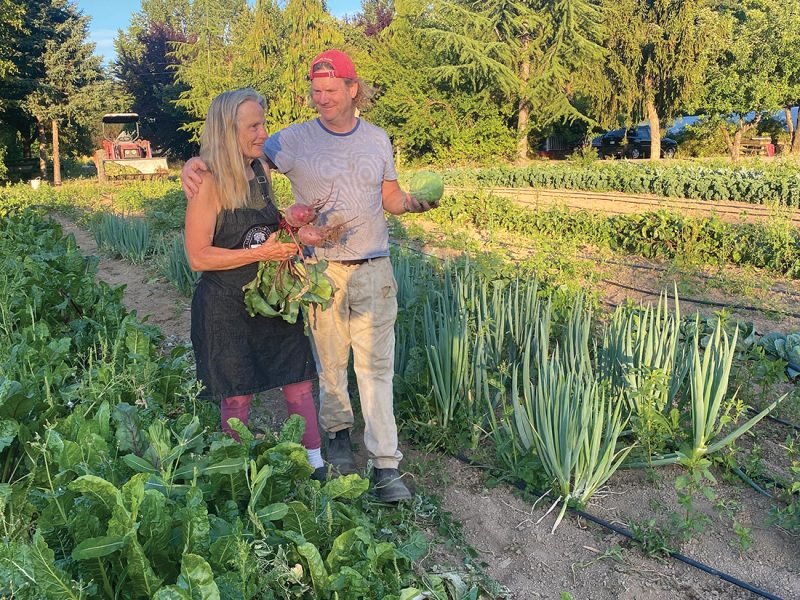DUNCAN – A well-loved farmstand and restaurant on Vancouver Island hopes a change in oversight of groundwater management will lead to a more collaborative approach to resolving licensing issues.
Katy and John Ehrlich of Alderlea Farm on Vancouver Island have run their award-winning farm for more than 20 years, growing a variety of vegetables and small fruits which are sold roadside, through a subscription program as well as served in their on-farm restaurant.
In 2020, they filed a groundwater licence application as existing users under BC’s new licensing regime in order to secure their farm’s historic water rights. The online application was, to all appearances, submitted – one of a handful received that year – and they went back to farming.
All seemed good until this summer, when drought conditions prompted requests for voluntary reductions in water use. Preliminary visits by natural resource officers were complimentary of their drip irrigation system.
But in mid-July, officers delivered an order under Section 93 of the Water Sustainability Act requiring them to shut off the well because the province said their water use was unauthorized.
“We are very conscientious about our watering,” says Ehrlich. “We had conservation officers come out and they said, ‘Oh wow, you’re good here; my boss will have no problem with what you’re doing.’ Then all off a sudden this order was presented.”
Within days, the Ehrlichs had a cistern installed and began trucking in water. A hydrologist was also hired to help them file a licence application as new users so they could resume using their well.
But they also applied for a stay of the order that cut them off – one of several filed this year regarding water shut-offs.
“Water is costly, and there’s no way we could irrigate our crops with shipped-in water, so we applied for a stay,” Ehrlich explains. “A stay was granted because of the irreparable harm this order would create for us.”
The stay set the scene for an appeal of the order, with a prehearing conference taking place before the BC Environmental Appeal Board on October 19. The attitude of the lawyers from the BC Ministry of Forests, which has managed the transition to the new groundwater licensing regime, was decidedly adversarial.
“[They] were really clear it wasn’t solutions-oriented,” she said.
The attitude is one reported by water users across the province, with several criticizing the unflinching attitude of natural resource officers who showed up in black Kevlar vests to serve Section 93 orders to what the province described as “suspected unauthorized users” or – as in Westwold – turn off irrigation infrastructure where licensed users resisted curtailment orders issued under Section 88 of the Water Sustainability Act to protect salmon.
“Our experience is that regulatory agencies are there to work as a team with people,” Ehrlich says. “We can be the best we can by working with the regulatory agencies.”
The stay shows that a more reasonable approach is possible, something she hopes will follow the mid-October transfer of responsibility for watershed management to the aptly named BC Ministry of Water, Land and Resource Stewardship (WLRS) from Forests.
“I think they will have a different place that they’re coming from to implement this,” Ehrlich says. “I’m hoping the new ministry will handle this in a different way.”
The province has not indicated if any changes are forthcoming. A statement to Country Life in BC framed the shift as part of a “necessary and natural” restructuring of resource management in BC. Transferring responsibility for groundwater licensing to the new ministry is simply the next step in that process. Water management branch staff attending a local watershed group meeting in Vernon on October 20 described the change as primarily one of oversight.
Wait and see
While the change in ministry is promising, Haley Argen of Nature Tech Nursery in Courtenay is waiting to see what it means for growers. She has long felt more could be done to manage water wisely across vulnerable watersheds.
She draws water from the Tsolum, one of four watersheds where irrigation of forage crops was curtailed under Section 88 orders this summer. The restrictions frustrated several local growers, with a delegation urging the regional district to step in and lead a comprehensive approach to water management that included forest management companies and other stakeholders.
Argen wasn’t part of the delegation, but she feels the new ministerial oversight could make a difference.
“I’ve always thought it made no sense for the Water Sustainability Act to be managed by the same ministry as manages our forests when the currently poor forest practices in BC have such a huge negative impact on our freshwater resources,” Argen says. “But whether it will be better for farmers is another question.”
A primary concern is how the new ministry will triage the thousands of cases of unlicensed water use across the province. Of about 20,000 known wells in BC whose owners were eligible to apply for licences as existing users prior to the March 1, 2022 deadline, just 7,711 applications were received.
Argen hopes there will be collaboration with staff in the agriculture ministry to ensure agricultural water use is given priority, so long as the operations are making efficient use of water.
There is also the question of the thousands of applications awaiting decision, not only from existing users but those who – like the Ehrlichs – submitted applications as new users after being issued cease-use orders.
As of October 23, just 2,411 groundwater licenses had been issued, including to new users. The backlog in decisions is estimated at up to four years, and the deluge of applications from the majority of well owners who have yet to apply has yet to arrive.
“Imagine what’s going to happen next year when those other 60% of people are presented with an order,” Ehrlich says. “If they continue in this way, it’s going to be a big, huge dark cloud over food production.”


 BCAC lobbying event positive
BCAC lobbying event positive